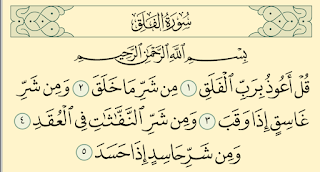Name of the Surah
This surah is called Al-Falaq because it begins with ‘Say, I seek refuge in Lord of al-Falaq, namely, daybreak.’ It was revealed in Makkah. It contains five ayat.
Surah Al-Falaq instructs Messenger Muhammad [peace be upon him] and his nation concerning how to seek refuge in Allah from the evil of the haters and magicians.
Relationship between Surah Al-Falaq and Al-Ikhlas
Surah Al-Ikhlas, which comes before surah al-Falaq, according to the written copy of the Quran, al-Mushaf, confirms Allah’s Oneness and that He has no wife nor offspring. Then surah Al-Falaq mentions how a believer can protect himself against the evil of the evildoers, who try to drive him away from worshipping Allah alone and performing righteous deeds, such as Satan and his progeny, and the evildoers among men and jinn.
Uqba Ibn Amir, may Allah be pleased with him, narrated that Messenger Muhammad [peace be upon him] said, ‘It has been revealed some ayat to me this night the like of which had never been revealed before, surah Al-Falaq and surah An-Nas.’
Aisha, may Allah be pleased with her said, ‘Whenever Prophet Muhammad [peace be upon him] went to his bed every night, he would cup his hands. Then, he would blow over them and recite surah Al-Ikhlas, al-Falaq, and an-Nas over them. Thereafter, he would rub his hand over whatever part of his body he could rub, starting with his head, face, and the front part of his body. He would do so three times.’
Most Important Topics Discussed in Surah Al-Falaq
Surah Al-Falaq speaks about seeking refuge in Allah from the evil of the creatures, especially, the darkness of the night, magicians, and the enviers.
English Translation of Surah Al-Falaq
Revealed in Makkah, Contains 5 Ayah
Bism-Allah ar-Rahman ar-Rahim
In the Name of Allah, the Giver of Mercy, the Most Merciful
113:1 Say, ‘I seek refuge in the Lord of the daybreak
113:2 from the evil of what He has created,
113:3 from the evil of the darkness when it comes,
113:4 from the evil of those who blow on the knots,
113:5 and from the evil of the envier when he envies.’
Tafsir
113:1 Say, ‘I seek refuge in the Lord of the daybreak
113:2 from the evil of what He has created,
In the Arabic language, al-Falaq, which is translated into daybreak, means separating something apart from another thing. The scholars of Tafsir mention the following meanings for it: 1) It is a prison in Hell. 2) It is one of the names of Hell. 3) It refers to all creatures. 4) It refers to the daybreak. 5) It refers to mountains and rocks that split, gushing forth water therefrom. 6) It refers to every creature that splits whether animals, plants, etc.
After mentioning the opinions of the scholars, Imam Muhammad Ibn Jarir at-Tabari, said, ‘The correct opinion is that Allah, Exalted be He, commanded His Prophet Muhammad to say, ‘I seek refuge in the Lord of the daybreak…’ In the Arabic language, Al-Falaq means daybreak. Al-Falaq may refer to a prison in Hell. However, Allah, Exalted be He, has not mentioned any proof confirming that Al-Falaq means one of the aforementioned meanings. Allah, Exalted be He, is the Lord of everything that He created. Thus, Al-Falaq refers to everything that splits.’
O noble Messenger Muhammad, say, ‘I seek refuge in the Lord of Al-Falaq. He is the One, who causes the day to break, and He is the Lord of all creatures. I seek refuge in Allah from the evil of what He has created since no one can protect against any evil but Him. He is the Creator and the Owner of all creatures. He manages their affairs and can change their condition from one state to another.’
113:3 from the evil of the darkness when it comes,
113:4 from the evil of those who blow on the knots,
113:5 and from the evil of the envier when he envies.’
After seeking refuge in Allah from all evil creatures, three types of evil are mentioned because they are the greatest evils.
O noble Messenger Muhammad, say, ‘I seek refuge in Allah from the evil of the night when it comes and grows dark, from the evil of the magicians, who blow on the knots to cast a spell over someone, and from the evil of the envier, who hopes that evil befalls other people, and hopes that they lose the blessings they enjoy.’
It is commanded to seek refuge in Allah from the night when it comes and grows dark because a dark night is frightening and one cannot know what is hidden under its darkness.
Learned Lessons from Surah Al-Falaq
• Surah Al-Falaq mentions how a believer can protect himself against the evil that may befall him, such as the evil of human beings, the jinn, Satan, beasts, etc.
• A believer should protect himself against evil by blowing on his cupped hands and then reciting surah Al-Ikhlas, al-Falaq, and an-Nas over them, as Messenger Muhammad [peace be upon him] has instructed the believers to do.
• Surah Al-Falaq instructs the believer to protect himself against evil, especially, the evil of the night when it grows dark, the witches when they cast a spell, and the envier, who wishes evil to befall someone.
• Wishing to have a blessing like someone is permissible, but wishing to harm him by wishing that the blessing he enjoys is forbidden.

No comments:
Post a Comment